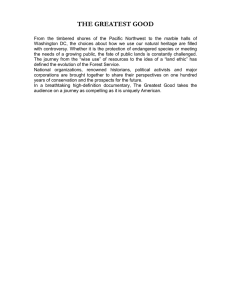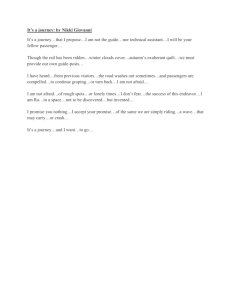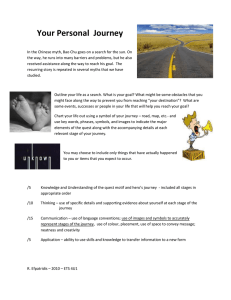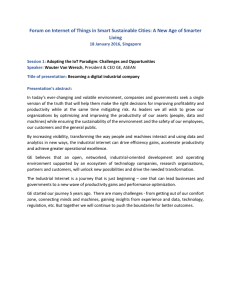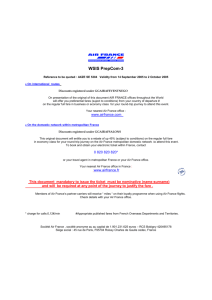Demonstrate knowledge of and process domestic air travel
advertisement
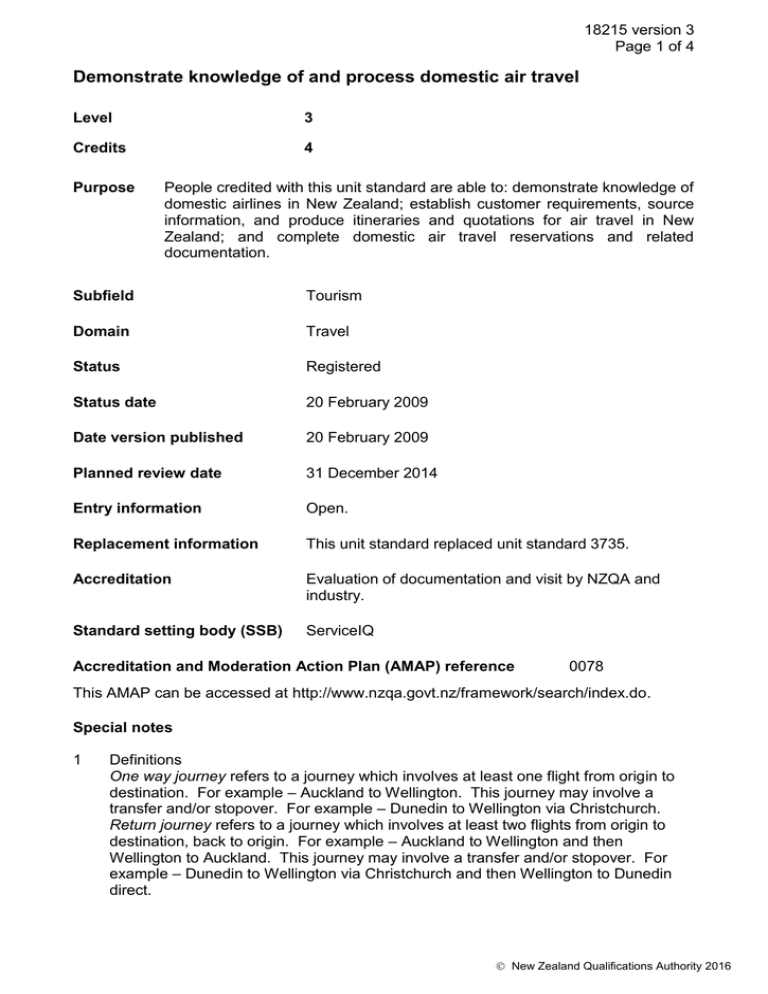
18215 version 3 Page 1 of 4 Demonstrate knowledge of and process domestic air travel Level 3 Credits 4 Purpose People credited with this unit standard are able to: demonstrate knowledge of domestic airlines in New Zealand; establish customer requirements, source information, and produce itineraries and quotations for air travel in New Zealand; and complete domestic air travel reservations and related documentation. Subfield Tourism Domain Travel Status Registered Status date 20 February 2009 Date version published 20 February 2009 Planned review date 31 December 2014 Entry information Open. Replacement information This unit standard replaced unit standard 3735. Accreditation Evaluation of documentation and visit by NZQA and industry. Standard setting body (SSB) ServiceIQ Accreditation and Moderation Action Plan (AMAP) reference 0078 This AMAP can be accessed at http://www.nzqa.govt.nz/framework/search/index.do. Special notes 1 Definitions One way journey refers to a journey which involves at least one flight from origin to destination. For example – Auckland to Wellington. This journey may involve a transfer and/or stopover. For example – Dunedin to Wellington via Christchurch. Return journey refers to a journey which involves at least two flights from origin to destination, back to origin. For example – Auckland to Wellington and then Wellington to Auckland. This journey may involve a transfer and/or stopover. For example – Dunedin to Wellington via Christchurch and then Wellington to Dunedin direct. New Zealand Qualifications Authority 2016 18215 version 3 Page 2 of 4 Multi-sector journey refers to a journey which involves two or more flights and must include a transfer and/or stopover. This could be a one way or return journey. Flexible fare refers to airfares which can be amended at no additional cost, and are fully refundable. Restricted fare refers to airfares which can be amended for an additional cost, and are either non-refundable or incur a cancellation fee. Travel industry workplace policies and procedures refer to documented instructions about workplace expectations, these must include but are not limited to – customer service delivery, personal presentation, legislation, organisational structure, business objectives. 2 This unit standard may be assessed against in a travel industry workplace when appropriate situations arise, or in a training environment if simulated workplace conditions are able to be provided that reflect the standard of a travel industry workplace. 3 Recommended texts for this unit standard are the ServiceIQ training resources. A list of these and an order form can be obtained from the ServiceIQ PO Box 25522, Wellington 6146, or by telephone on 0800 868 636, or available at http://www.serviceiq.org.nz. Elements and performance criteria Element 1 Demonstrate knowledge of domestic airlines in New Zealand. Performance criteria 1.1 Scheduled airlines that operate within New Zealand are identified and described in terms of the routes they fly. Range 1.2 Passenger baggage allowances are identified in terms of airline. Range 1.3 evidence is required for two airlines. checked, carry-on; evidence is required for two airlines. Passenger check-in facilities and check-in times are identified in terms of airline. Range evidence is required for two airlines. New Zealand Qualifications Authority 2016 18215 version 3 Page 3 of 4 Element 2 Establish customer requirements, source information, and produce itineraries and quotations for air travel in New Zealand. Performance criteria 2.1 Information obtained from the customer enables their needs to be determined. Range 2.2 Timetables and/or schedules are accessed to provide advice on flight options in accordance with customer requirements. Range 2.3 one way journey, return journey, multi-sector journey, flexible fare, restricted fare, adult, child and/or infant, unaccompanied minor. Fare rules are explained to customer in relation to itinerary and quotation prepared. Range 2.5 one way journey, return journey, multi-sector journey. Information obtained from timetables and/or schedules is used to produce an itinerary and quotation. Range 2.4 information may include but is not limited to – purpose of trip, timings, destination(s), budget, airline preferences, seating requirements, special services required. evidence is required for all itineraries and quotations produced in performance criterion 2.3. Customers are advised of security procedures at domestic airports in accordance with airport requirements and travel industry workplace policies and procedures. Element 3 Complete domestic air travel reservations and related documentation. Performance criteria 3.1 Reservations are made in accordance with customer and airline requirements, and travel industry workplace policies and procedures. Range 3.2 one way journey, return journey, multi-sector journey, flexible fare, restricted fare, adult, child and/or infant, unaccompanied minor. E-tickets are processed and/or requested in accordance with travel industry workplace policies and procedures and suppliers’ requirements. Range one way journey, return journey, multi-sector journey, flexible fare, restricted fare, adult, child and/or infant, unaccompanied minor. New Zealand Qualifications Authority 2016 18215 version 3 Page 4 of 4 3.3 E-tickets are provided to the customer in accordance with travel industry workplace policies and procedures. 3.4 An e-ticket re-issue is processed in accordance with travel industry workplace policies and procedures and suppliers’ requirements. 3.5 An e-ticket refund is processed in accordance with travel industry workplace policies and procedures and suppliers’ requirements. Please note Providers must be accredited by NZQA, or an inter-institutional body with delegated authority for quality assurance, before they can report credits from assessment against unit standards or deliver courses of study leading to that assessment. Industry Training Organisations must be accredited by NZQA before they can register credits from assessment against unit standards. Accredited providers and Industry Training Organisations assessing against unit standards must engage with the moderation system that applies to those standards. Accreditation requirements and an outline of the moderation system that applies to this standard are outlined in the Accreditation and Moderation Action Plan (AMAP). The AMAP also includes useful information about special requirements for organisations wishing to develop education and training programmes, such as minimum qualifications for tutors and assessors, and special resource requirements. Comments on this unit standard Please contact the ServiceIQ at qualifications@serviceiq.org.nz if you wish to suggest changes to the content of this unit standard. New Zealand Qualifications Authority 2016

